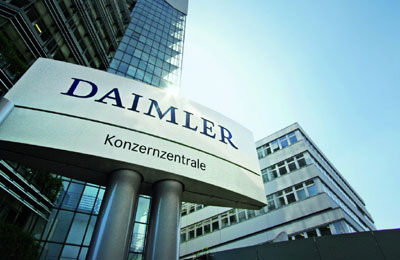
Derivatives 'led to Aabar ditching Daimler stake'
Dubai, October 15, 2012
By Dinesh Nair and Alexander Hübner
Aabar's disposal of its stake in Daimler earlier this month was triggered by a failed derivatives deal underpinning the Abu Dhabi investment firm's purchase of the shares, sources familiar with the matter said.
The German carmaker said Aabar sold its 3.07 percent stake on October 5, when it had a market value of about 1.25 billion euros ($1.6 billion). Aabar did not reveal the buyer nor the price at which the stake was sold.
However, four sources familiar with the matter told Reuters that rather than selling the stake, Aabar had relinquished it to banks including Deutsche Bank and Goldman Sachs after failing to finance the derivatives deals.
"The exit was not an outright stake sale that saw Aabar cash away its shareholding. The equity derivatives attached to the financing led to the stake being diluted," one banking industry source said.
The story of Aabar's Daimler stake underlines how some Middle Eastern investment firms entered derivative deals to finance acquisitions during the region's asset market boom several years ago, only to find the transactions mostly benefited the investment banks involved.
It also showed how high-profile equity investments by Gulf states can, in effect, become shorter-term financial plays even if they were intended as strategic, long-term investments.
That could be a worrying prospect for Western companies looking to raise long-term financing in the Gulf. Aabar and its parent, state-owned International Petroleum Investment Co, were not available to comment.
Deutsche Bank and Goldman and Deutsche declined to comment.
A Daimler spokesman said the company did not comment on the investment decisions of shareholders.
The sources asked not to be named because of the commercial sensitivity of the matter and the risk of losing future business in Abu Dhabi.
DERIVATIVES
Aabar, also an investor in major corporations such as commodities group Glencore and Italian bank UniCredit , bought 96.4 million Daimler shares, or 9 percent of the company, at 20.27 euros per share in March 2009.
It entered derivative transactions, mainly collar trades and put options, to finance the acquisition. The derivatives were sold by Goldman Sachs, the sources said.
A collar trade is an options strategy that limits the loss from a fall in an asset's price, while letting buyers assume more debt to finance a deal.
The acquirer buys an out-of-the-money put option for the shares while simultaneously writing an out-of-the-money call option. Banks acting as counterparties retain possession of the shares while the acquirer becomes the beneficial owner.
Banks can ask for margin payments on the collar from time to time, depending on the volatility of the share price in the market. If the margin is not paid, banks have the right to sell the shares to meet their costs.
A second banking industry source said collars were popular among Middle Eastern investors several years ago.
"The Middle East has gone a bit nuts over its usage as it would allow them to pick up high-profile assets while committing little upfront equity," he said.
In Aabar's Daimler deal, the collars were in a range of 36.41-24.71 euros per share and 27.66-18.72 euros per share for the period between June 10, 2010 and Sept 24, 2012, Aabar said in its 2009 annual report.
That exposed it to demands for margin payments after Daimler shares soared, hitting a high near 60 euros in early 2011 and ending last month at 37.67 euros.
Over the years, Aabar took steps to adjust its position. In May 2011, it raised 1.25 billion euros from the sale of bonds exchangeable into Daimler shares - a deal done with Bank of America, Deutsche Bank and Morgan Stanley.
Last year, it also restructured a collar transaction related to the Daimler stake, IPIC said in its 2011 financial statement.
In its 2011 annual report, Daimler quoted Aabar as stating in February 2012 its stake had fallen to 3.07 percent "due to a series of financing transactions".
LOSS
Such actions were not enough to protect Aabar's investment position. IPIC booked a $2.25 billion fair value loss in 2011 on the Daimler stake, hitting its full-year results.
"In theory the Daimler acquisition was a great buy. Aabar entered at the right time and the shares have doubled since then. How you end up booking a $2.3 billion fair value loss on an investment which has doubled in value is baffling," the second source said.
Aabar also has derivatives structures attached to its investments in Glencore and UniCredit, the sources said.
Among other derivatives-related mis-steps in the Gulf, Kuwaiti lender Gulf Bank was bailed out by the central bank in 2008 after losses incurred on derivatives took the bank to the verge of collapse. - Reuters







